IYCN and partners share experiences at July 19 meeting
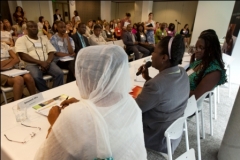 More than 150 participants joined the Infant & Young Child Nutrition (IYCN) Project at PATH on July 19, 2011 for a half-day meeting on community programming to prevent malnutrition during the first 1,000 days of life. Speakers from five countries and the project’s partners shared challenges, experiences, and future directions for community nutrition interventions during a lively discussion moderated by Denise Lionetti, IYCN Project Director.
More than 150 participants joined the Infant & Young Child Nutrition (IYCN) Project at PATH on July 19, 2011 for a half-day meeting on community programming to prevent malnutrition during the first 1,000 days of life. Speakers from five countries and the project’s partners shared challenges, experiences, and future directions for community nutrition interventions during a lively discussion moderated by Denise Lionetti, IYCN Project Director.
New tools for reaching caregivers, households, and communities
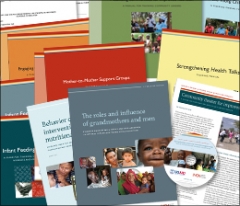 Stephanie Martin, IYCN Behavior Change Communication Specialist, presented the project’s new collection of tools for strengthening community-based nutrition programs. The collection includes literature reviews, training materials, and monitoring and evaluation tools. IYCN has used the resources to reach mothers and engage key influencers, such as men, grandmothers, and community leaders, to improve nutrition during the first 1,000 days of life.
Stephanie Martin, IYCN Behavior Change Communication Specialist, presented the project’s new collection of tools for strengthening community-based nutrition programs. The collection includes literature reviews, training materials, and monitoring and evaluation tools. IYCN has used the resources to reach mothers and engage key influencers, such as men, grandmothers, and community leaders, to improve nutrition during the first 1,000 days of life.
“IYCN developed the tools and resources for reaching mothers, families, and communities based on gaps we identified and the needs of country programs,” Martin said. For example, in Kenya, the Ministry of Health identified that men needed to be more engaged in infant and young child feeding, but no tools or guidance existed on how to engage them. To help program implementers engage fathers in nutrition activities, IYCN created a manual for training male group leaders on infant feeding and gender and refined it based on feedback from pilot-testing and findings from formative research.
Similarly, IYCN’s Strengthening Health Talks Manual addressed the need to improve the quality of health talks and group counseling. After IYCN used the manual to conduct a half-day training workshop for facility- and community-based workers in Zambia, infant feeding-focused health talks became more frequent and workers delivered more specific feeding messages.
Martin encouraged participants to use the resources together or separately in their community-based programs and to adapt them based on findings from formative research and programmatic needs. The collection is now available at www.iycn.org/community.
View a video of this presentation on YouTube.
A conversation with IYCN Country Coordinators
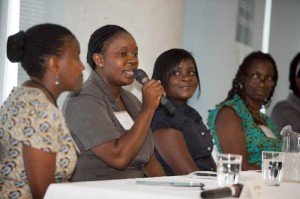 Janet Guta of Malawi, Belaynesh Yifru of Ethiopia, Mercy Nyamikeh of Ghana, Faith Thuita of Kenya, and Rose Mireille Exumé of Haiti shared lessons learned from implementing community-based nutrition programs during a conversation led by Altrena Mukuria, IYCN Senior Country Program Specialist.
Janet Guta of Malawi, Belaynesh Yifru of Ethiopia, Mercy Nyamikeh of Ghana, Faith Thuita of Kenya, and Rose Mireille Exumé of Haiti shared lessons learned from implementing community-based nutrition programs during a conversation led by Altrena Mukuria, IYCN Senior Country Program Specialist.
Speakers emphasized the importance of using formative research findings to design programs. In Kenya, for example, findings from IYCN’s formative assessment helped the project design appropriate interventions and culturally relevant tools to engage grandmothers and men in nutrition programs. “It became clear to us that grandmothers were happy to communicate through dance and song…so our plan is to work with them in that way,” said Faith Thuita.
Several speakers discussed opportunities to integrate nutrition into community-based health programs and other activities, including those focusing on HIV, agriculture, and gender. According to Belaynesh Yifru, IYCN identified opportunities to educate families about nutrition through an agriculture program targeting HIV-positive mothers in Ethiopia. Similarly, IYCN and partners integrated nutrition support for caregivers into the activities of community extension workers from the Ministry of Agriculture and the Ministry of Gender, Children, and Community Development in Malawi. “We were able to take advantage of the activities they were already doing in communities,” said Janet Guta.
Conversation with IYCN Country Coordinators
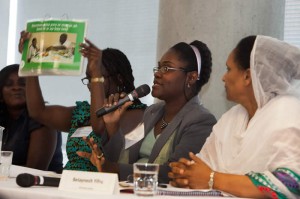 Mercy Nyamikeh shared lessons learned from ensuring the sustainability of community programming in Ghana. “Strengthening health systems…is the way to go for strengthening nutrition programs in the community, especially in the area of sustainability,” she said. In Ghana, IYCN is strengthening the government health system by working with partners to train volunteers and to offer nutrition support in communities, while collaborating closely with national and local governments to build the sustainability of programs.
Mercy Nyamikeh shared lessons learned from ensuring the sustainability of community programming in Ghana. “Strengthening health systems…is the way to go for strengthening nutrition programs in the community, especially in the area of sustainability,” she said. In Ghana, IYCN is strengthening the government health system by working with partners to train volunteers and to offer nutrition support in communities, while collaborating closely with national and local governments to build the sustainability of programs.
Speakers made recommendations that can be used by nutrition stakeholders to advance community nutrition programs. Rose Mireille Exumé said, in Haiti, it is critical to address gaps in human resources, including a lack of trained community health workers. Speakers also suggested that finding opportunities to work with other health sectors to integrate nutrition interventions and include nutrition as part of routine policy and budgeting activities can help to ensure that community programming is sustained.
View a video of this discussion on YouTube: Part 1; Part 2; Part 3
Making community programs more effective
During a panel discussion, IYCN’s partners shared insights on how to make community programs more effective.
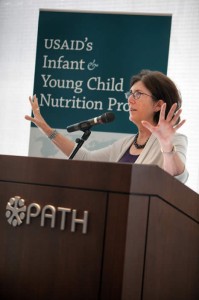 The voice of the caregiver should drive programs
The voice of the caregiver should drive programs
Marcia Griffiths, President of The Manoff Group, discussed the need for more effective use of formative research among community-based nutrition programs.
“If you look at successful nutrition programs from early on, a key lesson that emerged was the importance of formative research,” said Griffiths. She noted that the caregiver’s voice drove the development of successful programs in Thailand and other countries during the 1980s, but that programs had moved away from effective use of formative research that was at the core of these efforts.
Not all countries have the same behavior profiles,” said Griffiths. She encouraged participants to conduct formative research to understand nutrition behaviors, use the findings to address specific behaviors, and to bring the voice of the caregiver into program materials. She said materials should address local foods and beliefs and behavioral priorities in addition to including actionable messages.
PowerPoint presentation: Remedial Action Needed: Our failure to use formative research effectively
View a video of this presentation on YouTube.
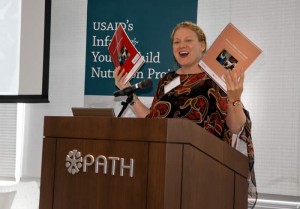 Let me show you, let’s practice
Let me show you, let’s practice
Lenette Golding, Communications Advisor at CARE, shared experiences from CARE’s efforts to train women so that they can assist other women through mother support groups in resource-poor settings.
CARE recently changed the way it trains support group facilitators to influence infant and young child nutrition practices. “We’ve had to alter the way we train our mother support group facilitators. It’s been a real paradigm shift,” said Golding. “It’s not a top-down education where you are going to explain some facts and figures. It’s all modeling: Let me show you, let’s practice….”
During training sessions, CARE focuses on improving knowledge about infant and young child feeding and building interpersonal communication, creative thinking, and problem-solving skills to help mothers effectively facilitate support groups. “It takes practice,” said Golding.
PowerPoint presentation: Training Women to Help Women: Mother Support in Resource Poor Settings
View a video of this presentation on YouTube.
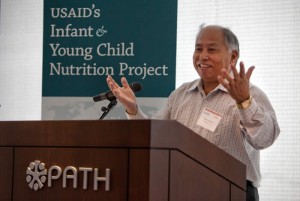 If you work through an existing system, you can reach every household
If you work through an existing system, you can reach every household
Ram Shrestha, Senior Quality Improvement Advisor for Community and Nutrition at University Research Corporation, LLC., discussed strengthening quality improvement in communities by utilizing community health system networks.
“In the community, we have to look at the system and then work through that system,” said Shrestha. When it comes to reaching households, you can work with existing community groups, such as women’s groups, to integrate nutrition information. He suggested that it is not necessary to create a new system or to spend a lot of money to reach communities with nutrition programs.
View a video of this presentation on YouTube: Part 1; Part 2
Photos: Aurelio Ayala III, Ram Shrestha, PATH/Evelyn Hockstein
Date: Jul 20, 2011 | Category: Events
